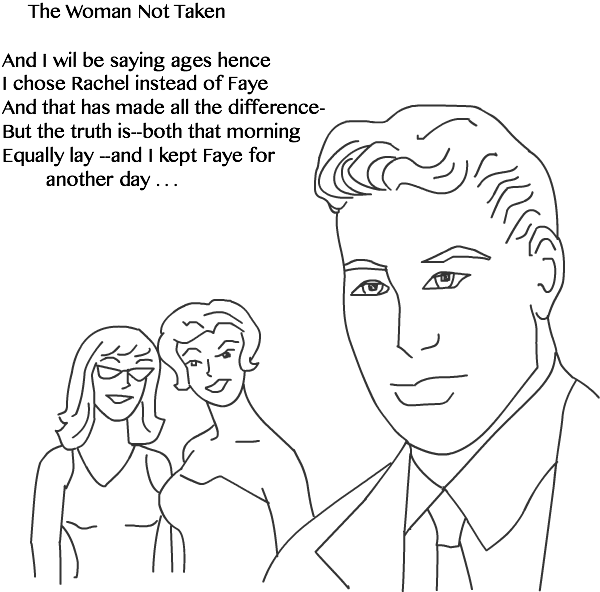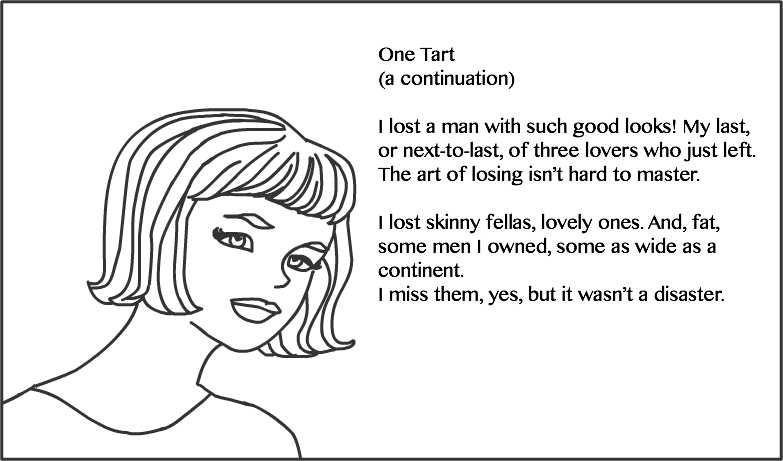I keep making these love comics out of Shakespeare's sonnets. It's addictive. Also, it's addictive playing with the brush feature on Flash.
Viewing entries tagged
comics
I am having so much fun making Shakespeare's sonnets into love comics . . .
It's hard not to think of Keats' ode "To Autumn" at this time of year. For some reason the poem always reminds me of Mom--maybe because she read it aloud to me (she had this way of reading poetry--she sounded just like Katherine Hepburn), maybe because she loved fall so much, and because she survived TB. I think of Keats writing this poem when he was ill with the disease.
I have a rule that I make myself follow. If I don’t like a particular kind of writing, I have to try to do it, at least once. Or twice. That was part of my logic for writing Why God Is a Woman.
Because I used to believe that I disliked political poetry. I didn’t want to listen to anyone pontificating, especially poets. Most political poetry, I reasoned, left me feeling indignant, and I don’t like indignation. I don’t even like the word. It gets stuck in the back of my nose and makes me yearn for cough syrup. It has that Robitussin flavor.
I reasoned, I prefer the personal to the political. Of course, the personal can be very political, but it doesn’t have to be, right?
Maybe I’m not unique in this respect. In the book, Half the Sky, the writers Nicholas Kristof and Sheryly WuDunn describe how general statistics about the plight of girls and women by NGOs do not inspire donations nearly as effectively as personal stories. So telling people that between 600,000 and 800,000 girls and women and boys are trafficked across borders each year, while millions more are trafficked within their own borders, is less moving than telling a tale of a single girl sold into slavery. Especially if you give that girl a name.
Names have such power.
I was thinking about that last night while watching the Democratic debate. I was impressed with O’Malley’s story about gun violence, in part because he told the tale of one family’s fight against the NRA. He took the issue so personally, he looked as if he might break out into tears or rage at any moment. I was actually surprised. He was such a human being up there.
I was also surprised that I enjoyed the debate. What’s wrong with me? I asked myself.
Usually I get this creepy feeling while watching political events or debates—the same feeling I had as a child while watching a circus act. I am not sure what’s real or true. So many facts (or are they lies?) tossed up in the air, the politicians walking on a trapeze they might fall from if they lose their confidence or don’t think quickly enough. Some appear to be clowns. Others magicians. Still others are so glossy, so masked, so well-trained at keeping the ball balanced just-so on their noses. How can they stand the endless charade? For many it goes on for months or years.
The circus quality of politics reminds me of Garcia Marquez, of his One Hundred Years of Solitude in which the political and the surreal are one and same. So the colonel, after years of war, can’t remember why he’s fighting. He longs for death and goes home to make little gold fishes in his studio. The making of gold fishes, he states, is as significant as waging war.
In an interview with WYSU, I was asked if I was thinking of Marquez when I wrote Why God Is a Woman, because the book has elements of magical realism. In it I created my own Maconda or imaginary country, although my imaginary country is an island where women rule, and men are the beautiful sex. I fell so in love with my island, I still dream of it some nights and wake up wanting to add pages to the book.
While many of the prose poems in Why God Is a Woman are not political, many are. What really surprised me was how much fun they were to write. Poems like “Vagina Envy” and “The Token Man” were a pure delight. They were my ice cream and cake. I found myself laughing aloud as if on a sugar high, and thinking that men probably do suffer from vagina envy. Why shouldn’t they? After all, as Eve Ensler points out in The Vagina Monologues, vaginas are something to envy.
I also found myself seeking out and loving political poetry. I realized the obvious, that there are so many political poets and poems I already loved including Carolyn Forche’s “The Colonel,” many of Tim Seible’s poems including “The Debt” and “After All,” so much of Yehuda Amichai’s and Eduardo Galeano’s poetry. I especially love Galeano’s The Book of Embraces. I think of his poem, “The Language of Art” whenever cell phone- users manage to photograph acts of violence. His poem ends: The photo was a coup. Chinolope had managed to photograph death. Death was there: not in the dead man, nor in the killer. Death was in the face of the barber looking on.
And I feel myself looking on.
Now that I'm thinking of food and poetry, it's hard not to mention Ben Jonson (I always spell it Johnson) and his wonderful "Inviting a Friend to Supper." For a long time I wanted to know what Canary wine was. Tom Clark informed me that it's wine from the Canary Islands. Shakespeare talks about Canary wine as well.
I thought of this comic when I was reading The Paris Review article by David Orr on "The Road Not Taken," that suggests this often quoted poem is one of the most misread poems in the country.
Watching the debates last night, I thought of Emma Lazarus's famous poem, "The New Colossus." When was our country last that welcoming?
I keep thinking of new poems I could add to WHY GOD IS A WOMAN--about all the ways the world would be different if gender roles were reversed. One of my friends emailed and suggested I should draw a Boberto doll--the male version of a Barbie doll that I wrote about in the book, but I don't think the drawing would pass the Facebook censors.
If only we poets didn't have to write a narrative essay for the Ohio Arts Council grants! I really pause when I try to answer these questions about my work.
I have read that Smart's Jeoffry is the most famous cat in literature, more famous than the Cheshire cat perhaps. When I think of cats, I think how they consider me, as much as vice versa. As if perhaps I don't live up to their standards. In drawing the comic, I was thinking of how people become so much like their cats and dogs after a time.
In his book, State of the Art, David Lehman writes that "Dover Beach" is the most parodied poem of all time. My favorite poem to parody is "Annabel Lee," perhaps because it was the first poem I fell in love with. When I was a girl, my father used to say that Edgar Allan Poe had once wandered in the woods behind our house. He called them the Usher Woods. Of course, I believed him.
In The State of the Art, David Lehman writes: "Whitman recalls the moment when, as a boy alone on the shore of Long Island, he heard two mockingbirds sing, and then one stopped singing and the other missed his mate and sang elegiac songs to her, and suddenly Whitman understood his purpose in life, "what I am for."
I never was attached to that great sect,
Whose doctrine is, that each one should select
Out of the crowd a mistress or a friend,
And all the rest, though fair and wise, commend
To cold oblivion, though it is the code
Of modern morals, and the beaten road
Which those poor slaves with weary footsteps tread,
By the broad highway of the world, and so
With one chained friend, perhaps a jealous foe,
The dreariest and the longest journey go.
Note: I've been reading David Lehman's The State of the Art. This poem was discussed in the chapter titled 2013 with the subtitle, "It was his poetry that kept him going." It begins with the sentence: "Shelley's 'Defense of Poetry' (1821) culminates in an assertion of poetry as a source not only of knowledge but of power.
I've been thinking about that. Poetry, a source of power.





















